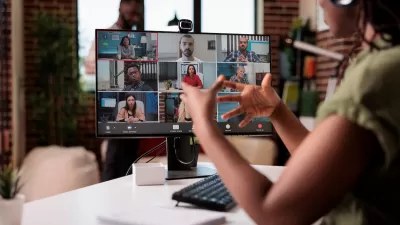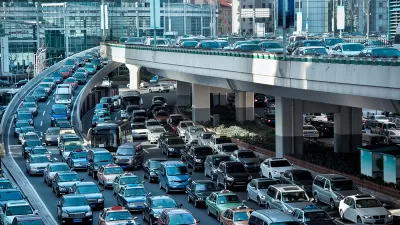According to "boundary theory," a daily commute gives us time to do the emotional work of switching roles and establishing a separation between work and home life.

After a year of working from home, writes Jerry Unseem in The Atlantic, "[m]any people liberated from the commute have experienced a void they can’t quite name." Without the daily trip to and from work, "[t]here are no beginnings or endings. The hero’s journey never happens. The threshold goes uncrossed." Useem questions what role the commute plays beyond getting people to and from work.
"In 1994, an Italian physicist named Cesare Marchetti noted that throughout history, humans have shown a willingness to spend roughly 60 minutes a day in transit," a constant that has held true, for the working class as well as the wealthiest industrialists. Today, the average American one-way commute clocks in at 27 minutes.
Participants in a UC Davis study gave a number of reasons for wanting a short–but not non-existent–commute: "the feeling of control in one’s own car; the time to plan, to decompress, to make calls, to listen to audiobooks." According to Gail Sheehy and a body of research known as boundary theory, "[y]ou get a very strong feeling of two lives with the train a bridge." The commute "is actually a relatively efficient way of simultaneously facilitating a physical and psychological shift between roles."
Useem recommends a set of habits that can help us set boundaries when working from home. Clothing, he writes, can make a big difference in your focus. "In office attire, you can’t take out the trash or water the lawn without a strong feeling that you ought to be doing something else. Like your job." He cites other examples from corporate-ritual designer Ezra Bookman, such as "lighting variations, warm-up stretches, cellphone-free walks, and, as he demonstrated to me over Zoom, shrouding your computer in a fine blue cloth when you log off, as if it, too, needs a good night’s sleep."
Ultimately, Useem says, creating new rituals can help you "replicate what the commute did for you"–the benefits we didn't appreciate until they were gone.
FULL STORY: The Psychological Benefits of Commuting to Work

Trump Administration Could Effectively End Housing Voucher Program
Federal officials are eyeing major cuts to the Section 8 program that helps millions of low-income households pay rent.

Planetizen Federal Action Tracker
A weekly monitor of how Trump’s orders and actions are impacting planners and planning in America.

Ken Jennings Launches Transit Web Series
The Jeopardy champ wants you to ride public transit.

‘Minnesota Nice’ Isn’t so Nice When You Can’t Find a Place to Live
The Economic Development and Housing Challenge Program can help address the scourge of homelessness among Indigenous people.

NYC Open Streets Organizers Call for City Support
The number of open streets projects has dropped year after year as volunteer groups struggle to fund and staff them.

Crime Continues to Drop on Philly, San Francisco Transit Systems
SEPTA and BART both saw significant declines in violent crime in the first quarter of 2025.
Urban Design for Planners 1: Software Tools
This six-course series explores essential urban design concepts using open source software and equips planners with the tools they need to participate fully in the urban design process.
Planning for Universal Design
Learn the tools for implementing Universal Design in planning regulations.
Heyer Gruel & Associates PA
Ada County Highway District
Institute for Housing and Urban Development Studies (IHS)
City of Grandview
Harvard GSD Executive Education
Toledo-Lucas County Plan Commissions
Salt Lake City
NYU Wagner Graduate School of Public Service





























